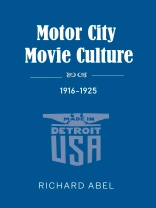Motor City Movie Culture, 1916–1925 is a broad textured look at Hollywood coming of age in a city with a burgeoning population and complex demographics. Richard Abel investigates the role of local Detroit organizations in producing, distributing, exhibiting, and publicizing films in an effort to make moviegoing part of everyday life. Tapping a wealth of primary source material—from newspapers, spatiotemporal maps, and city directories to rare trade journals, theater programs, and local newsreels—Abel shows how entrepreneurs worked to lure moviegoers from Detroit’s diverse ethnic neighborhoods into the theaters. Covering topics such as distribution, programming practices, nonfiction film, and movie coverage in local newspapers, with entr’actes that dive deeper into the roles of key individuals and organizations, this book examines how efforts in regional metropolitan cities like Detroit worked alongside California studios and New York head offices to bolster a mass culture of moviegoing in the United States.
Table des matières
Acknowledgements
List of Abbreviations
Introduction
Entr’Acte 1: The Michigan Film Review
1. Mapping Circulation in Detroit’s Movie Market
Entr’Acte 2: Detroit Area Picture Theaters
Entr’Acte 3: John H. Kunsky and George W. Trendle
2. Movies, Live Acts, and the Theatrical Experience: Programming Practices in the Motor City
Entr’Acte 4: Detroit-Made Films
Entr’Acte 5: The Metropolitan Film Company
3. ‘Detroit-Made’ Newsreels and Other Short Nonfiction Films
Entr’Acte 6: Star Gazing
4. Motor City Newspapers, Menus for Movie Fans
Afterword
Bibliography
Index
A propos de l’auteur
Richard Abel is Professor Emeritus of International Cinema and Media Studies at the University of Michigan. He is author of Americanizing the Movies and ‘Movie-Mad’ Audiences, 1910-1914, and Menus for Movieland: Newspapers and the Emergence of American Film Culture, 1913-1916, editor of the Encyclopedia of Early Cinema, and co-editor of Early Cinema and the ‘National’ (IUP, 2008) and The Sounds of Early Cinema (IUP, 2001).












